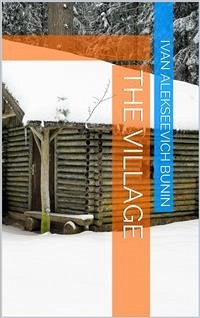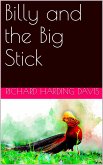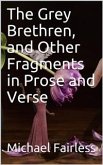Translation of Derevnia.
The Village (romanized: Derévnya) is a short novel by the Nobel Prize-winning Russian author Ivan Bunin, written in 1909 and first published in 1910 by the Saint Petersburg magazine Sovremenny Mir (issues Nos. 3, 10–11) under the title Novelet. The Village caused much controversy at the time, though it was highly praised by Maxim Gorky (who from then on regarded the author as the major figure in Russian literature), among others, and is now generally regarded as Bunin's first masterpiece. Composed of brief episodes set in its author's birthplace at the time of the 1905 Revolution, it tells the story of two peasant brothers, one a brute drunk, the other a gentler, more sympathetic character. Bunin's realistic portrayal of the country life jarred with the idealized picture of "unspoiled" peasants which was common for the mainstream Russian literature, and featured the characters deemed 'offensive' by many, which were "so far below the average in terms of intelligence as to be scarcely human."
The novel's title had to do with an idea formulated by one of its characters, a local self-styled eccentric named Balashkin. According to the latter, Russia as a whole amounts to one huge Village and "the fate of its wild and poor peasantry is the fate of the country as such." "My novel depicts the life of rural Russia; along with one particular village it is concerned with life of Russia as a whole", Bunin told Odessky Listok newspaper in 1910.
In October, 1909, Birzhevye Vedomosty newspaper's literary critic predicted that "This new thing, ideologically very explicit, will cause controversy and stir up both the left and the right." Indeed, The Village came as a surprise for many, especially for Marxist critics. "Who could have thought that this refined poet... [singer] of all things exotic and 'otherworldly'... would create such an ultra-real, Earth-smelling piece of truly rough literature", Vatslav Vorovsky wrote.
Literary critics from both the left and the right, were unanimous in one verdict: "peasantry in Bunin's novel was painted by one brush: black." "Poignant hopelessness is what this gloomy tapestry emanates; pessimism and even negativity is what felt in every stroke of the painter's brush", wrote Odessky Novosty critic (signed N.G.) on October 13. "Each and every page of it cries out something about how vile and ugly Russian muzhik is, to what extent Russian peasantry is degraded," agreed L.Voitolovsky of Kiyevskaya Mysl, arguing that not a trace of light could be found there, that could be seen as present in Russian rural life-related works of Anton Chekhov, Ivan Turgenev, Gleb Uspensky and Fyodor Reshetnikov. "Bunin's pattern is monochromatic and monotonous, always slightly tendentious," wrote Yelena Koltonovskaya in 1912.
By all this Bunin wasn't impressed. "Read some of what's been written. Both praises and put-downs are so utterly banal and flat," he wrote Gorky. The latter replied: "I know for sure that when this astonishment is over […] serious people will rightly say: ???????, besides having all these artistic merits, became this first impulse that made our broken Russian society to think seriously – not of muzhik or of common people, but of Russia as a whole; it poised the question: is Russia to be or not to be?"
The Village (romanized: Derévnya) is a short novel by the Nobel Prize-winning Russian author Ivan Bunin, written in 1909 and first published in 1910 by the Saint Petersburg magazine Sovremenny Mir (issues Nos. 3, 10–11) under the title Novelet. The Village caused much controversy at the time, though it was highly praised by Maxim Gorky (who from then on regarded the author as the major figure in Russian literature), among others, and is now generally regarded as Bunin's first masterpiece. Composed of brief episodes set in its author's birthplace at the time of the 1905 Revolution, it tells the story of two peasant brothers, one a brute drunk, the other a gentler, more sympathetic character. Bunin's realistic portrayal of the country life jarred with the idealized picture of "unspoiled" peasants which was common for the mainstream Russian literature, and featured the characters deemed 'offensive' by many, which were "so far below the average in terms of intelligence as to be scarcely human."
The novel's title had to do with an idea formulated by one of its characters, a local self-styled eccentric named Balashkin. According to the latter, Russia as a whole amounts to one huge Village and "the fate of its wild and poor peasantry is the fate of the country as such." "My novel depicts the life of rural Russia; along with one particular village it is concerned with life of Russia as a whole", Bunin told Odessky Listok newspaper in 1910.
In October, 1909, Birzhevye Vedomosty newspaper's literary critic predicted that "This new thing, ideologically very explicit, will cause controversy and stir up both the left and the right." Indeed, The Village came as a surprise for many, especially for Marxist critics. "Who could have thought that this refined poet... [singer] of all things exotic and 'otherworldly'... would create such an ultra-real, Earth-smelling piece of truly rough literature", Vatslav Vorovsky wrote.
Literary critics from both the left and the right, were unanimous in one verdict: "peasantry in Bunin's novel was painted by one brush: black." "Poignant hopelessness is what this gloomy tapestry emanates; pessimism and even negativity is what felt in every stroke of the painter's brush", wrote Odessky Novosty critic (signed N.G.) on October 13. "Each and every page of it cries out something about how vile and ugly Russian muzhik is, to what extent Russian peasantry is degraded," agreed L.Voitolovsky of Kiyevskaya Mysl, arguing that not a trace of light could be found there, that could be seen as present in Russian rural life-related works of Anton Chekhov, Ivan Turgenev, Gleb Uspensky and Fyodor Reshetnikov. "Bunin's pattern is monochromatic and monotonous, always slightly tendentious," wrote Yelena Koltonovskaya in 1912.
By all this Bunin wasn't impressed. "Read some of what's been written. Both praises and put-downs are so utterly banal and flat," he wrote Gorky. The latter replied: "I know for sure that when this astonishment is over […] serious people will rightly say: ???????, besides having all these artistic merits, became this first impulse that made our broken Russian society to think seriously – not of muzhik or of common people, but of Russia as a whole; it poised the question: is Russia to be or not to be?"









